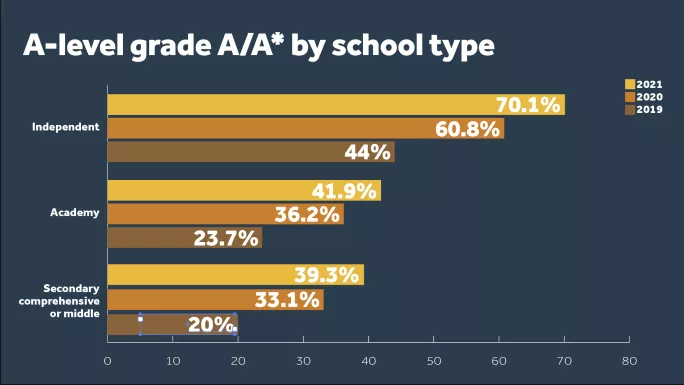A levels 2021: A*s rise by three times more at private schools

The gap in the proportion of A*s awarded to private and state schools has widened year-on-year, today’s figures reveal.
This year, 39.5 per cent of independent school A Level grades were A*s, up from 27.4 per cent in 2020 and 16.1 per cent in 2019, when national exams were last held.
This means that, year-on-year, private schools have seen a 12.1 percentage point increase.
State comprehensives and middle schools, meanwhile, have seen a much smaller increase in the proportion of entries awarded an A*.
This figure is 15.3 in 2021, up from last year’s 11.4 - a 3.9 percentage point increase.
The gap between independent and state comprehensives amounts to 24.2 percentage points in 2021 - up from 16 in 2020.
The figures follow concern in government and elsewhere about a rise in the attainment gap between independent and state schools.
However, some have pointed out that levels of relative growth between private and state schools have not changed significantly.
Private schools have seen the largest increase in A grades, up 9 percentage points to 70% this year. At state academies the increase is around 6 points. Levels of *relative* growth however are similar between state and private, with private schools starting from a higher base.
- Carl Cullinane (@CullinaneCarl) August 10, 2021
More than 70 per cent of A-level grades awarded to private school students today are at A or above, compared with around two-fifths of state secondaries,
The figure for private schools is a boost of 9.3 percentage points compared with last year - a bigger absolute jump than in either state comprehensives or academies.
In academies, 41.9 per cent of grades are at A and above this year, up from 36.2 per cent last year - a 5.7 percentage point rise.

And in state comprehensives and middle schools, the figure rose by 6.2 percentage points, from 33.1 per cent to 39.3 per cent.
Private schools saw the highest boost to top grades in absolute terms than any other types of school other than those classed as “other”, which includes language schools, higher education and tutorial colleges, special schools, pupil referral units, prisons and young offender institutes.
These saw a rise of 9.4 percentage points.
A levels 2021: Results at a glance
A levels 2021: Third of teachers fear excess appeals
A levels 2021: Under 1% schools told to change grades
In relative terms compared with 2020, schools in the “other” category saw the biggest jump in top grades, with schools in this group seeing a 53.4 per cent increase in A*s.
Independent schools increased their A*s relative to 2020 by 44.1 per cent, while A grades were up by 15.2 per cent.
Secondary selective schools and academies both saw a 15.2 per cent increase in the proportion of grades at A/A*, relative to 2020.
Comprehensives and middle schools increased top grades by 34 per cent for A* in relative terms and 15.2 per cent for grade A.
Sixth form colleges saw the lowest increase in their outcomes at grade A and above out of all school types, with an increase of 3.8pp. Comprehensive schools had a rise of 6.2pp.
At grade C, outcomes were relatively stable for all school types, and the largest increases at grade C were for “other” schools (+1.9pp) and free schools (+1.6pp).
“Exam boards looked at student work from all types of school and college as part of the external quality assurance process,” Ofqual’s report on results says.
“They did not find that any type of school or college was more likely than others to have provided grades that did not reflect the standard of their students’ work,” it adds.
“Indeed, they found that, irrespective of the type of school or college, the grades were largely supported by the quality of students’ work. It is also worth noting that more able students are also generally more capable of independent study.”
Ofqual said outcomes for all types of schools and colleges have increased compared with last year, but the extent of this “may partly reflect longstanding differences in the distribution of grades for different centre types”.
Ofqual’s report said: “For example, in normal years, the distribution of grades for students attending independent centres is clustered around the top grades.
“A uniform increase in grades awarded across all types of school and college is therefore most likely to benefit students attending independent schools at the top grades.
“For other centre types, the impact of increased grades may be lower down the grade distribution - wherever most of their candidates are normally clustered.”
But educational charity The Sutton Trust said the coronavirus crisis has “compounded existing inequalities and today’s results are a reflection of that”.
Founder and chairman Sir Peter Lampl said: “Since March 2020, our research has consistently shown how much harder state schools - particularly those in less affluent areas - have been hit by the pandemic.
“The pandemic has compounded existing inequalities and today’s results are a reflection of that.
“We’re seeing growing gaps between independent and state schools at the top grades. This poses an immediate challenge for university admissions.
“While it’s encouraging to see more students from less affluent areas going to university this year, it’s of real concern that the gap between those from less affluent areas and those from well-off areas has grown.
“Given that disrupted learning has affected lower income youngsters more, we urge universities to give additional consideration to disadvantaged students.”
You need a Tes subscription to read this article
Subscribe now to read this article and get other subscriber-only content:
- Unlimited access to all Tes magazine content
- Exclusive subscriber-only stories
- Award-winning email newsletters
Already a subscriber? Log in
You need a subscription to read this article
Subscribe now to read this article and get other subscriber-only content, including:
- Unlimited access to all Tes magazine content
- Exclusive subscriber-only stories
- Award-winning email newsletters
topics in this article



